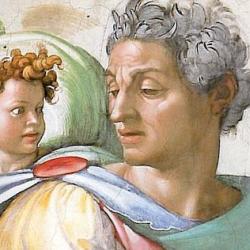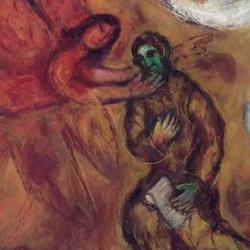In Psalm 80, the Psalmist is dismayed at Yahweh’s abandonment of His vine. Isaiah (Isaiah 5) laments but is not dismayed. He knows why the lover, his friend, has abandoned His vineyard-bride and now brings an indictment against her.
What kind of grapes did Yahweh want? What kind of wine did He expect? Isaiah 5:7 tells us: Yahweh waited for justice and righteousness, but instead saw nothing but bloodshed and a cry of distress. Isaiah reinforces the dashed expectations with wordplays: Yahweh expected judgment – mishpat, but instead found only outpouring of blood – mishpach; he looks for righteousness, tzedeqah, but found only a cry of helplessness and pain – tza’aqah. No, Yahweh insists: Mishpat, not mishpach! Tzedeqah, not tza’aqah! Can’t you hear??
Much of the rest of the chapter details the bad fruit that Israel has produced, the practices and attitudes and actions that have led to a cry of distress. In a series of six woes, Isaiah condemns Judah’s unrighteousness and lack of justice.
Woe to those who touch house to house, who bring near field to field, until there’s no room. Woe to the greedy, Isaiah says. Woe to those who are insatiable in their desire for more, more houses, more land, more stuff. That is worthless fruit; that is fruit that provides no Sabbath wine, no rest, no justice, no peace.
Isaiah envisions someone who keeps adding onto his house, adding a new house whose walls join to the house, and this keeps growing and growing and growing, until the house takes up acres and acres of land. He envisions someone buying the adjoining piece of property, and then the next, and then the next, until his nearest neighbors are miles and miles away.
Isaiah focuses not on the amount of stuff that the greedy accumulate. He focuses instead on the isolation that that massive inequalities of wealth create. They keep extending their property lines until they are along in the midst of the land. One guy, living in a vast house on a vast estate, with no one around him. It’s not the wealth that Isaiah condemns, but the use of wealth to insulate and isolate us from others, rather than to serve others. The greedy don’t make friends using the Mammon of unrighteousness; because of the Mammon of unrighteousness, they have no friend or neighbors. It doesn’t work anyway. They keep extending their fields so that they can produce more and more and more. But Isaiah warns that the land will become unproductive, hard. In God’s economy, there’s an intimate relationship between social intimacy and productivity.
Woe to those who drink from morning to night, who wake up wanting and drink and drink until it is nearly the next morning again. That too is worthless fruit, grapes that produce no Sabbath wine, no rest, no justice.
Isaiah is satirizing the self-indulgence of the people of Judah, but he is also attacking their counterfeit worship. Israel gathered at the temple to eat and drink wine and strong drink, and they gathered at the temple to celebrate God’s works in song, to the accompaniment of lyre, hard, tambourine, flute. The temple instruments are here, and so is the wine and strong drink of temple festivities, but instead of celebrating the works of Yahweh, the people of Judah drink themselves into a stupor, drink themselves into forgetfulness of the works of Yahweh.














